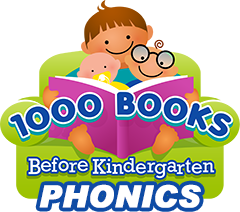Reading readiness skills develop very early in life. By working with your child and helping your child learn to read you will be setting up your child for a lifetime of success. Programs like the 1000 Books Before Kindergarten Phonics course are an important tool for this success.
According to literacy experts, reading grows a child’s vocabulary, knowledge, imagination and self-confidence. Reading also helps develop logic and problem solving skills.
In order to teach a child to read, you have to start with the basics—learning the alphabet and associating letters with sounds.
Letter knowledge is knowing the letters of the alphabet and recognizing them in print. Alphabetical principle is the concept of associating letters with sounds and sounds with words, knowing for instance that “B” makes the “buh” sound. These skills are critical for children to be able to learn to decipher the text on the page. Children will often begin to notice letters that are familiar to them first, such as the letters in their name, or other letters they frequently see around them such as the S on stop signs.
Shier, C., ABC’s of Early Literacy: The importance of developing early literacy skills
Then you need to move on to more advanced skills, such as sounding out words and recognizing sight words. One way to develop these more advanced skills is through a preschool phonics course.
It is absolutely critical that you start building literacy skills early. Children who begin kindergarten with poor reading skills will fall behind and often have a tough time catching up. The most important skill you can teach your child for future academic success is learning to read. Help your child develop a life long love of reading.

